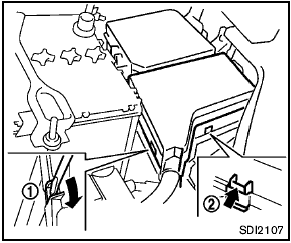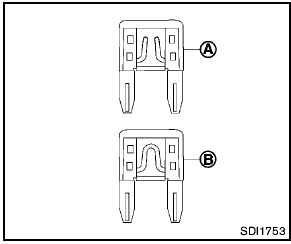 Nissan Rogue: Engine compartment
Nissan Rogue: Engine compartment


Never use a fuse of a higher or lower amperage rating than that specified on the fuse box cover. This could damage the electrical system or cause a fire.
If any electrical equipment does not operate, check for an open fuse.
1. Be sure the ignition switch and the headlight switch are turned off.
2. Open the engine hood.
3. Remove the air cleaner duct. (See “Engine compartment check locations” earlier in this section.) 4. Remove the fuse/fusible link holder cover using a suitable tool 1 and pushing the tab 2 .
5. Remove the fuse with the fuse puller located in the passenger compartment fuse box.

6. If the fuse is open A , replace it with a new fuse B .
7. If a new fuse also opens, have the electrical system checked and repaired by a NISSAN dealer.
Fusible links
If any electrical equipment does not operate and fuses are in good condition, check the fusible links. If any of these fusible links are melted, replace only with genuine NISSAN parts.
 Fuses
Fuses
...
 Passenger compartment
Passenger compartment
Never use a fuse of a higher or lower
amperage rating than that specified on
the fuse box cover. This could damage
the electrical system or cause a fire.
If any electrical equipment d ...
See also:
If the wireless remote control does not operate
Vehicles without smart key system
Locking and unlocking the doors: Use the key
Vehicles with smart key system
Locking and unlocking the doors: Use the mechanical key. ...
Phonebook (phones with automatic phonebook download
function)
NOTE:
Phonebook commands are not available
when the vehicle is moving.
For phones that support automatic download of
the phonebook (PBAP Bluetooth profile), the
“Phonebook” command is u ...
Headlamp Off Delay
When this feature is selected, the driver can choose to
have the headlights remain on for 0, 30, 60, or 90 seconds
when exiting the vehicle. To make your selection, press
and release the SELECT ...
